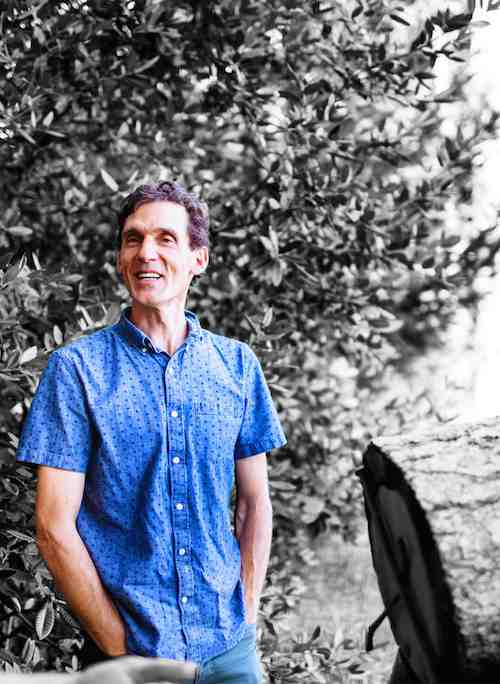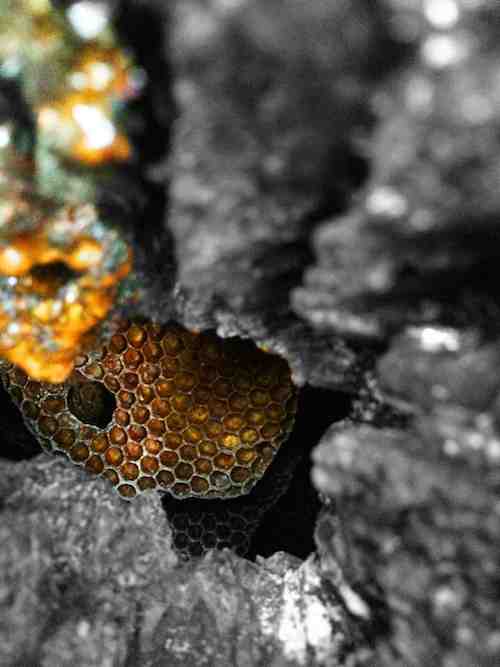Natural apiarist Michael Thiele speaks for the bees.
Michael Thiele stands at the top of a ladder propped against a pine tree, peering cautiously into a small hole in a barrel-shaped capsule that is propped in the branches and covered with tree bark. “Hello,” he says softly. “Good morning.”
A beady-eyed fuzzy face appears in the cork-sized hole, seeing who has come knocking. The creature seems to stretches its limbs and take a breath, then turns and vanishes back into the dark. Thiele puts his ear against the cylinder. “It’s very quiet,” he says.
There may be only a few hundred honeybees in the hive. Colonies generally shrink during the winter, but in this era of wavering bee populations, whether their numbers will bounce back again in the spring is the question on almost every apiarist’s mind. For Thiele, a German-American who works with bees in Sebastopol, the fact that bee numbers have declined throughout much of the world is particularly frustrating since he believes he knows the cause of the phenomenon, often called Colony Collapse Disorder, and how to resolve it.
Bees, warns Thiele, are being destroyed by conventional agriculture and by conventional beekeepers themselves. The pesticides applied to fruit trees, the unnatural way bees are kept in densely clustered hives, the food the bees are fed, the medications they receive—all, Thiele says, are pushing the decline of one of the Earth’s lynchpin species, an animal at the core of the biosphere which provides crucial pollination services for one third of the world’s cropland.
“Every time in the spring when I see a swarm of bees I cry because I am so happy that they are still here, that this wasn’t the year,” Thiele says.
It wasn't until 2010 that Thiele first pushed his bare hands into a seething mass of thousands of bees.
Super Organisms
Thiele, who runs a consulting service called Gaia Bees, teaches apiculture workshops around the world and sells handmade hives—and is anything but a conventional beekeeper. He likens mass-scale honey farms to factory farming of egg hens. He does not use conventional beekeeping equipment or wear protective gear. He can move a swarm of bees with his bare hands. He also subscribes to a school of thought that loosely defines a bee colony—though not an individual bee—as a mammal, because masses of bees generate heat at a temperature similar to that of humans and because each hive, he feels, has a detectable personality, a soul.
“The bee colony is a super-organism, like ants and like coral reefs,” he explains. A hive, he says, is not a mere cluster of 50,000 bees. “Instead, we must see that there is one super-organism with 50,000 cells.” He uses the German word, one English speakers might recognize, to name this super-organism: Bien.
Narrow scope views of old-school science tend to miss the subtleties of the bee world, Thiele says, while an approach of quantum science and intuition can serve as a more sensitive magnifying glass. He hopes to teach his approach to bee husbandry to others, especially the next generation of farmers and apiarists who will inherit the Earth, its ecology, and hopefully, its bees.
Bee Dreams
Yet reaching the young remains elusive, at least in the short-term. In the United States, the average age of a farmer is nearing 60. “That makes it very hard to change the existing industry,” Thiele says, “but in the next 10 years there is going to be a huge turnover with young people entering the industry, and it will be essential to have a dramatic paradigm shift.”
Part of this education, he stresses, involves banishing old vernacular—like the term “worker bee.”
“Calling them ‘worker bees’ is a projection of your intention to make the hive a honey machine,” Thiele says. Even the word “beekeeper” generates a fundamental misunderstanding of these animals.
“People don’t keep bees,” Thiele says. “There is no beekeeping. There is human-keeping. Bees keep us.”
Thiele first entered the world of Apis mellifera—the European honeybee—in 2001, when he was living as a lay-ordained Zen monk at Green Gulch Farm Zen Center just south of Muir Beach. He says he had been dreaming vividly of bees that spring and he decided to reach out and make contact with the creatures. He installed a commercial bee box in his yard. Within days, a swarm moved in. Thiele stood by quietly and watched, entranced.
“They went spilling into it like a genie into a bottle,” he says. Thiele studied the bees for weeks—but something, he says, “just didn’t feel right.” It was the angular shape of the box, a geometric intrusion into the soft and ovoid world of bees.
He began looking for alternative ways to house bees and eventually began making his own hives based on bees’ natural building style—capsules shaped like hollowed out logs, others like large dangling eggs. He would find homes in friends’ yards for these hives and place them there indefinitely, semi-permanent fixtures of the landscape built strictly for use by bees. His ethos became one of accommodating a creature of nature, not trying to tame and possess it. He moved to Sebastopol in 2005 and has become a well-known figure in apiculture, invited to give seminars in Denmark and Hungary, and recently accepting an invitation to lecture at the San Francisco Exploratorium.
But it wasn’t until 2010 that Thiele first pushed his bare hands into a seething mass of thousands of bees.
“It was so warm,” he remembers. He discovered how mild-mannered bees could be. He began answering house calls to come and collect bee swarms—and he always came without protective clothing and gloves. “I want people to see this other side of bees, that they are actually gentle and calm,” he says.
Oceans of Almonds
Apis mellifera is not a New World native. Like horses, like almond trees, like most of us, the European honeybee came to the Americas in relatively recent times—probably in the 1600s. In the New World, amid an evolving landscape, the honeybee naturalized and has become a major vector of pollen transfer. It’s said that one bite of food in every three we take can be credited to the work of bees. Indeed, while honeybees would arguably fare better in our absence, we, and so many other species, would be scrapping for food to eat if bees vanished.
You cannot understand bees completely if you believe they are just tools for making honey. Michael Thiele
“Yet people call themselves ‘beekeepers,’” Thiele says. He goes on: “Language shapes perception, and perception shapes language. You cannot understand bees completely if you believe they are just tools for making honey.” The term “beekeeper”—which Thiele avoids—diminishes our capacity to appreciate the full scope of bee life, he says, the fact that their colonies are mammalian super-organisms, and how very dependent we are on the species.
Most of all, believing we are beekeepers allows us to reduce bees to personal property—or at least try to. Each winter, more than a million beehives nationwide are stacked inside trailer-trucks like crates of oranges and delivered to California’s Central Valley. Here, the boxes are placed in the region’s vast ocean of almond orchards. The boxes are opened and the bees set to their task of pollinating millions of trees—a service the almond industry depends on.
Since WWII, bee numbers have declined in many parts of the northern hemisphere. Thiele lands the blame smack on the agriculture and apiculture industries. Both, he says, fail to respect or acknowledge the needs of bees and the fact that if their future folds, ours could too. At times, fungicides have been applied to the orchards in the presence of bees, he says. It’s widely agreed—even by more mainstream thinkers—that exposure to chemicals has weakened bees’ immune systems and made them vulnerable to disease and the feared Varroa mite.
“Without bees, there would not be a single almond,” Thiele says. “Profit depends on life, and they are taking it for granted that there will be another bee season. The almond growers are just hoping the most likely scenario will not happen.”
The phenomenon of vanishing bees has been named Colony Collapse Disorder—a choice of words that Thiele scorns. To call the vanishing of bees a “disorder” suggests there is something mysteriously wrong with the insects themselves.
“It’s not a disorder,” he emphasizes. “That’s a euphemism. It’s poisoning. We are directly poisoning bees in the almond orchards, and the industry wants to look for chemical solutions so they don’t have to change their system.”
The inertia of an $11 billion industry is hard to turn around, but Thiele insists on a difficult solution. The vast almond monoculture, almost void of life except for California’s most precious tree fruit, must be reassembled into diversified plantings—less lucrative by nature, less productive by acre, but, Thiele says, able to exist “without medical support.” He also suggests that bees be allowed to inhabit such farms year-round, as part of a more natural pollination system and not one requiring cross-country shipment.
Not everyone agrees. Eric Mussen, an apiculturist with the U.C. Davis Department of Entomology and Nematology, allows that bee numbers have definitely declined for decades and, until about 10 years ago, were on a trajectory that would have left us without the beneficial insects by the year 2035. Chemical applications in agriculture and apiculture were likely causes of this crash, he says. However, he avers, the decline stopped about seven years ago.
“It’s not like we’re going to be out of bees in five or 10 years,” Mussen says, adding that while numbers are lower than they were 60 years ago, the population of about 2 million beehives in America is holding steady. “We’re hanging in there,” he says.
For now, Thiele is making small changes to the world of bees, one hive at a time. He builds and sells them to apiarists just entering the trade. Other hives he keeps in his neighborhood, while some go further afield. Throughout Marin and Sonoma counties, he has about three dozen beehives of his own, which he visits periodically to check on the inhabitants and, sometimes, to bring home some honey.
People don’t keep bees. There is no beekeeping. There is human-keeping. Bees keep us. Michael Thiele
Paradigm Buzz
Thiele’s own evolution from layman to a sort of bee whisperer came rapidly and naturally. Meanwhile, other apiarists are coming around, too, he says. A shift is underway, as people everywhere who spend much time observing bees, and listening to them, begin to understand that current systems of industry may not be suitable for the animals. “I think,” Thiele says cautiously, “that people are waking up.”
Back at his log hive in the branches of the pine tree, Thiele is still trying to determine the size of the colony inside. He hopes there are enough to secure at least one more year of life for this colony. “Without each other, they die,” Thiele notes sadly, a thought that supports the notion that bees are just cells within a greater mammalian super-organism.
Conventional beekeeping doesn’t see all this, instead recognizing just the bee, the insect, the honey machine, the crop pollinator.
“There is so much that science cannot see,” Thiele says, before putting his ear against the hive once more. He closes his eyes and listens to the bees.



